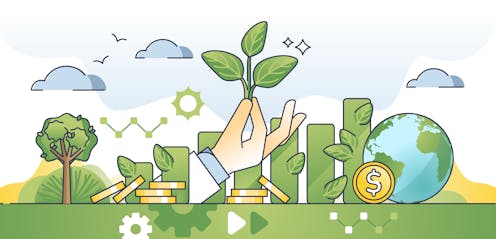Many ‘impact investors’ aren’t fully tracking whether their investments are good for society or the environment − new research
- Written by Lauren Kaufmann, Assistant Professor of Business Administration, University of Virginia

Investors can aim not only to make money but to benefit society while doing so. But few of those impact investors[1] follow up on whether their strategy is having a positive impact, we found in a study published in the Journal of Business Ethics[2].
Impact investing aims to generate financial returns while also creating positive social or environmental outcomes. But having the intention of doing good by selecting the right assets doesn’t guarantee that you will. We call this uncertainty “impact risk.”
After conducting 124 interviews with impact investors and an experiment with 435 participants, we found that, rather than evaluate impact risk directly, many impact investors presume that they will succeed at having a positive effect on the world when they assess their investment options.
In other words, they assume that certain businesses, such as solar energy companies or microfinance initiatives, are inherently good for society. This “win-win” mindset leads investors to focus primarily on financial performance rather than on evaluating whether their investments are achieving social or environmental impacts. Often, this means that investors can’t determine whether specific investments perform better than others on social metrics.
We found that this mindset discourages investors from seeking information that might point to shortcomings in an investment’s social performance.
Why it matters
Impact investment, a rapidly growing area of finance, surpassed US$1.5 trillion globally by the end of 2024, according to the Global Impact Investing Network[3]. The industry has attracted a range of investors[4], including wealthy individuals, banks, development finance institutions, corporations, foundations, pension funds and religious institutions.
Nearly 75%[5] of younger individual investors, including millennials and Gen Z, prioritize aligning investments with their social values.
With much of the projected $84 trillion in wealth[6] expected to be inherited from older people by 2045 flowing to millennials and other younger Americans, in what has been called the “great wealth transfer[7],” financial institutions such as Goldman Sachs[8], Morgan Stanley[9] and Vanguard[10] are trying harder to appeal to impact investors. They now offer a range of investment options promising both social impact and financial performance.
We found, however, that good intentions alone may not deliver consistent social impact. Without robust risk assessments and ongoing evaluations of whether investments have the intended outcomes, impact investments may fall short of their goals.
What still isn’t known
Many questions remain about how investors can effectively assess impact risks without creating potentially onerous reporting requirements – for themselves or their clients. Some of our related research[11] has determined that financial managers are concerned about this potential burden.
But new regulations are likely anyway. For instance, a proposed Securities and Exchange Commission rule[12] would require public corporations in the U.S. to disclose risks associated with climate change. Yet, due to pending litigation, the rule’s implementation has been delayed – perhaps indefinitely[13].
What’s next
Our next phase of research is building on these findings by examining how impact investors seek out and respond to evidence of underperformance. With additional colleagues at the University of Virginia, we are currently investigating whether moral clarity – the extent to which people feel confident in their ethical decision-making – influences investors’ behavior.
By continuing to research connections between impact and financial performance, we aim to contribute to a broader conversation, both in academia[14] and in practice[15], about how to ensure investments truly benefit people and the planet.
The Research Brief[16] is a short take about interesting academic work.
References
- ^ impact investors (www.investopedia.com)
- ^ Journal of Business Ethics (doi.org)
- ^ Global Impact Investing Network (thegiin.org)
- ^ range of investors (thegiin.org)
- ^ Nearly 75% (corporate-adviser.com)
- ^ $84 trillion in wealth (www.nytimes.com)
- ^ great wealth transfer (www.ml.com)
- ^ Goldman Sachs (www.goldmansachs.com)
- ^ Morgan Stanley (www.morganstanley.com)
- ^ Vanguard (investor.vanguard.com)
- ^ related research (doi.org)
- ^ proposed Securities and Exchange Commission rule (www.sec.gov)
- ^ delayed – perhaps indefinitely (www.federalregister.gov)
- ^ academia (link.springer.com)
- ^ practice (www.ifc.org)
- ^ Research Brief (theconversation.com)







